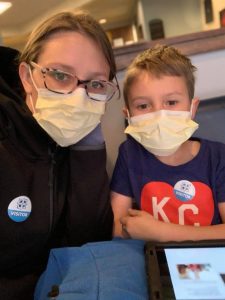At 5 months old, my oldest son had his first allergic reaction. We didn’t know for sure at the time, but we suspected that what I ate for dinner (eggs) had touched his skin and caused his whole body to break out in hives. We rushed to the urgent care where he received a super dose of antihistimine.
Throughout the next several months, small reactions to various other irritants would occur and we believed more allergies were likely. At 14 months, a skin test confirmed he was allergic to eggs, wheat, peanuts, and tree nuts.
In our family culture, food is a large part of our celebrations, connections, and activity. We enjoy eating new flavors, and trying new dishes, cooking, and baking together. It was a challenging adjustment when foods we love were off limits. “Good-bye, Quiche Lorraine!”
Eventually, my husband and I accepted the idea that we were a “food allergy” family and tried to figure out how to protect our son (and eventually our daughter) from the things that their bodies consider “poison.”
It was stressful for me in particular because I enjoy cooking and baking. It also made me feel like we were often putting people out. Rejecting someone’s well-planned meal or realizing that their home has little your child can eat can be awkward.
But it did get better.
Here are some practices I learned early on which have made life easier and safer
- We primed our friends, “Hey, we’re coming over. We’ll bring our own food for our toddler, so don’t worry about him!” Safe snacks in the diaper bag were as necessary as diapers.
- We became experts on reading food labels.
- We taught our son to ask, “Is this OK for me to eat?”
- We made sure the grandparents and babysitters knew how to use an epipen and when to administer an antihistimine if necessary.
These habits, in addition to having a pediatric allergist who we trust implicitly, brought great peace of mind.
We have been lucky in our allergy journey to meet other families sharing our circumstances.
In writing this article, I asked another allergy mom and dear friend to share some tips that helped her family adjust to being an allergy family.
Tips From Allergy Mom: Brittany S.
- When dining in a restaurant, request to speak directly to a manager or chef about food allergies.
- Type up a small allergen card to hand to servers at a restaurant, so they have written down what needs to be avoided
- Sign up for Food Allergy Research and Education (FARE) emails. Share their resources with your family to help them understand the severity of the allergen and explain how dangerous a mistake could be for your child.
- Meet with teachers, school nurses, directors, and Sunday school teachers to go over child’s allergy plans before the start of school.
- Offer to bring snacks for all of the children at playdates.
How To Make School & Travel Safer: Oral Immunotherapy (OIT)
 We still needed to make sure our son was safe when traveling and going to school. I researched different therapies that have been shown to reduce a child’s reactivity. Many allergy therapies are VERY controversial. Every family (with their doctor) has to decide what is right for them. I felt strongly about making my son as safe as possible, even with risks. When our pediatric allergist told us he offered Oral Immunotherapy (OIT), we knew it was something we would try.
We still needed to make sure our son was safe when traveling and going to school. I researched different therapies that have been shown to reduce a child’s reactivity. Many allergy therapies are VERY controversial. Every family (with their doctor) has to decide what is right for them. I felt strongly about making my son as safe as possible, even with risks. When our pediatric allergist told us he offered Oral Immunotherapy (OIT), we knew it was something we would try.
OIT, in my own words, is a method of reducing allergen sensitivity by introducing a small amount of the allergen over time. If you’re familiar with allergy shots, it is a similar process, but rather than introducing it sub-dermally (under the skin), the allergen is introduced orally (eaten).
Our son was introduced to small (micrograms) amounts of his allergens over two-three years. He started at 2 years 11 months and continues to eat small doses of peanuts, cashews and pistachios five days a week. In the beginning, he experienced side effects like stomach aches and occasional intestinal discomfort. After each dose, my son had to sit still for 30 minutes and could not be physically active for a few hours. It was a challenge.
The amount of work and time OIT requires is mind-boggling, but because I was well-informed by our allergist and my own research, I knew that was part of the commitment.
The peace of mind that OIT brings is priceless. My son is still mildly allergic to nuts, but if he comes into accidental contact with them in a public place, they won’t kill him.
Some children are not allergic after their OIT experiences. This has not been our story, but we are hopeful that his allergen numbers (Immunoglobulins or IgE) will continue to go down each year and eventually he’ll be able to decide how much and when to eat peanuts and tree-nuts in the future. Until then, we are grateful for the care he’s received as well as the peace that we continue to experience because of OIT.
Parents of kids with food allergies have stories that may be similar or very different in their timeline and severity, but many of us allergy parents walk away from a food allergy diagnosis with fear.
Food can kill my kid? Yes. The weight of that responsibility can be overwhelming. The good news is that you aren’t alone.
















